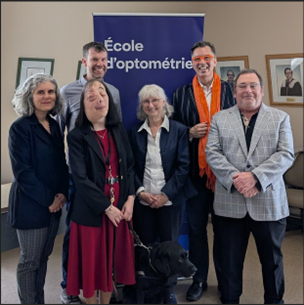Vision Loss Rehabilitation Canada Distinguished Community Partner Award

The VLRC Distinguished Community Partner Award, established in 2022, recognizes VLRC's community partners for their outstanding contributions in expanding access to integrated vision loss rehabilitation. Working together, VLRC and their community partners enable blind or partially sighted Canadians to live the lives they choose.
The award is presented annually to an individual, a group or an organization.
The “Why” Behind VLRC’s Distinguished Partner Award
We truly value our VLRC community partners, recognizing their vital role in collaborating with us and providing support. Together, we strive to make a significant impact in our mission to contribute to improving the lives of individuals who are blind or partially sighted.
These valuable contributions extend beyond geographical boundaries, reaching people locally, regionally, nationally and even internationally. Our partners actively engage with their communities, fostering collaboration with other community partners and stakeholders to create positive change.
Artist Profile: Meghan Sims
VLRC is fortunate to have the Award custom-designed by professional painter and glassblower, Meghan Sims, who is based in Kitchener, ON.
As a graduate of the Haliburton School of the Arts, Meghan has achromatopsia, a rare visual condition limiting her sight to black and white shades at close range. With eyes that are extremely sensitive to light, Meghan brings a personal perspective to her artwork.
Part of Meghan’s mission is to help educate people about the differences in perception that exist in the world, and she wants to increase tolerance for those differences, particularly when they involve a disability.
Learn more about Meghan at meghansims.ca.
Eligibility, Nominations and Selection Process
To be eligible, an organization, community group or individual must demonstrate – through activities, innovative programs or a special project – an outstanding commitment to partner with VLRC for the purpose of:
A. Maximizing health and independence for Canadians impacted by vision loss
B. Driving better individual outcomes, creating healthier communities and
C. Improving equitable access to rehabilitation services
The Award Committee uses the following four criteria to assess the nominations in their selection process:
- Contributions - to improving the lives of people who are blind or partially sighted.
- Impact - on improving the lives of people who are blind or partially sighted.
- Reach of Contribution - local, regional national, international, number of people who benefited, individuals or groups.
- Engagement of their Community - the extent of the level of engagement of collaboration with community partners, stakeholders and/or recipients.
Nomination and Selection Timeline
The nomination period is open between January to February 15 each year. The adjudication and selection process follows at the close of the nomination period. The award presentation is in May during Vision Health Month.
Want to submit a nomination?
Please contact awardscommittee@vlrehab.ca to obtain the nomination form and the related information.
Previous recipients
2025 – Dr. Walter Wittich and the University of Montreal’s Vision Science team

Back row: Dr. Joe Nemargut and Dr. Walter Wittich.
Dr. Wittich is a distinguished researcher and associate professor at the School of Optometry, University of Montreal. His expertise lies in low vision rehabilitation, with a focus on improving the lives of individuals with visual impairments through innovative approaches and technologies. He holds a PhD in Rehabilitation Science and has a strong background in occupational therapy, bringing a unique interdisciplinary perspective to his work.
The University of Montreal is the only Canadian university to offer a master’s degree in visual impairment and rehabilitation. Graduates of this program are equipped to deliver rehabilitation services to individuals with visual impairments while also engaging in applied and clinical research. The program is offered in French and English.
Dr. Wittich’s remarkable leadership has played a vital role in the success of VLRC's partnership with the University of Montreal's Master of Vision Science program since 2018. This collaboration is truly making a difference in shaping the professional workforce both in Canada and around the globe. Together, we’re making significant strides in vision rehabilitation and empowering Canadians with partial vision or blindness to live their lives to the fullest!
2024 – Dr. Anuradha (Anu) Mishra

Dr. Mishra, a renowned ophthalmologist and educator in Halifax, Nova Scotia, is the 2024 award recipient. Her significant contributions to vision rehabilitation include establishing the innovative Marjorie Fountain Low Vision Clinic, which provides comprehensive eye exams and vision rehabilitation services on the same day. Beyond her clinical practice, Dr. Mishra is dedicated to educating future medical professionals about the importance of vision rehabilitation, ensuring that patients with vision loss receive the best possible care.
2023 – Kingston Health Sciences Centre (KHSC) Ophthalmology department

KHSC ensures its mandate of centering patient care reaches within its local Kingston community and beyond. In addition to providing care for patients within the Kingston area, KHSC serves people with vision loss in Northern Ontario and those from remote, fly-in communities. The KHSC Ophthalmology department has made significant contributions to improving the lives of people who are blind or partially sighted, and the team has consistently gone above and beyond to serve the best interests of VLRC’s clients.
